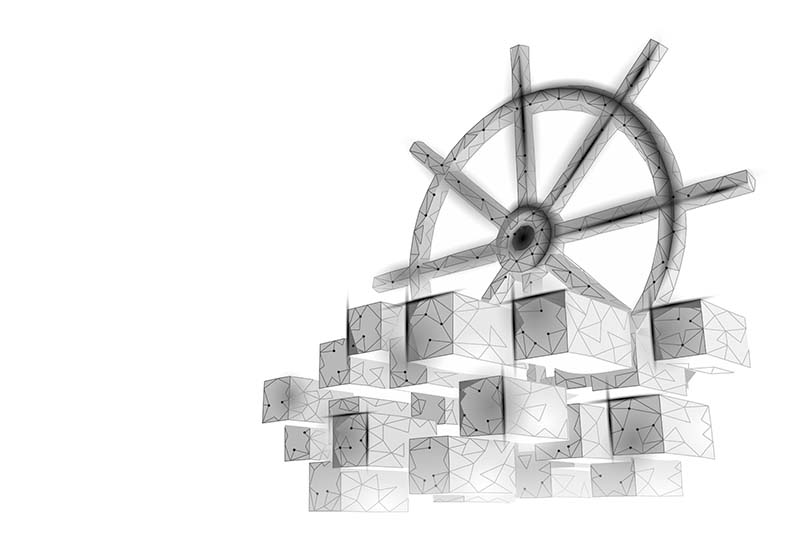Containerization is a growing trend across several large enterprises in the world today. Gartner estimates that 75% of companies across the globe will use containerized applications during production in 2022, an increase of 30% from 2020.
Container orchestration helps to automate the management, deployment and scaling of containers. Orchestrating container deployment and management can be advantageous to enterprises managing thousands of containers. The advantages of container orchestration include faster deployment cycles, increased automation, reduced IT costs, and the development and testing of AI applications and models.
In this article, you’ll learn about container orchestration, its benefits, tools, and how it works.
What Is a Container?
A container is a streamlined software package made up of all the executables, libraries, settings, and tools the software requires to run. Containers isolate packages from their environments, enabling uniform operation regardless of differences between environments such as staging and development.
Containers help to facilitate consistency, portability, and performance across different environments by leveraging virtualization technologies. It can house anything from small microservices to large applications.
A container cluster may consist of one or several containers for larger application deployments. Containers offer several essential benefits that include:
- Resource Utilization: With their lightweight nature, containers consume fewer resources and help to optimize and balance application workloads.
- Increased Portability: Containerized applications can run on a wide variety of platforms, environments, and operating systems.
- Consistency: Containers provide uniformity, ensuring that teams run applications the same way, regardless of their deployment environment.
- Higher Efficiency: Containers make it possible to deploy, patch, and scale applications more quickly.
- Enhanced Application Development: Containers assist agile and DevOps teams in accelerating development, testing, and production cycles.
Containers vs. Virtual Machines
It’s common for people to confuse containers, VMs, and/or server virtualization technology as the same. While containers and virtual machines share some similarities, they are quite different. Each virtual machine runs in a hypervisor environment, which contains its guest operating system and the associated libraries, binaries, and applications.
When multiple virtual machines share a single server, the overhead cost and system resources used can be remarkably high. On the other hand, containers share the host operating system or kernel and are typically only a few megabytes in size. That means that a container starts in mere seconds, unlike virtual machines taking minutes or gigabytes in size.
What Is Container Orchestration and Why Do You Need It?
Container orchestration is the process of automating every aspect of a container’s lifecycle such as management, deployment, scaling, provisioning, load balancing, and networking. Container orchestration can be immensely beneficial to enterprises with hundreds or thousands of containers.
You can use container orchestration to automate and control several other tasks such as:
- Provisioning and deployment
- Availability and redundancy
- Scaling up or scaling down for load balancing
- Host migration
- Resource allocation
- Cluster management
- Health monitoring
- External service exposure and discovery
The core benefits of container orchestration include increased productivity, portability, and security.
How Does Container Orchestration Work?
By using a container orchestration tool such as Docker or Kubernetes, you can define the configurations of an application via a JSON file or YAML. The configuration file specifies where a configuration management tool should locate container images, the network configuration, and the storage location for log files.
Container management tools automatically locate the right host when deploying a new container to a cluster, according to its requirements or constraints. These tools also manage the container’s lifecycle according to the specifications present in the compose file. Container orchestration applies to any environments running containers, such as on-premise servers, public or private clouds.
Container Orchestration Tools
Kubernetes
Kubernetes is the most popular container orchestration solution among large enterprises, especially those that adopt the DevOps approach. It was originally created and standardized by Google before being adopted by the Cloud Native Computing Foundation. It is widely supported and readily available through several cloud services such as AWS, Microsoft Azure, IBM, and more.
Kubernetes facilitates the automation of building, scaling, packaging, scheduling, managing, and deployment of application services across numerous containers. It makes it easy to cluster and manage Linux containers running on the cloud, virtual machines, or physical machines. Kubernetes is an excellent platform for hosting and rapidly scaling cloud-native applications.
The Benefits of Using Kubernetes:
- Highly scalable platform that allows you to scale up or scale down according to usage needs, efficiency, and several other factors
- Helps to manage and distribute workloads across several cloud infrastructures without altering the underlying application
- Deliver a Platform-as-a-Service option for DevOps teams
- Track and monitor container services health and implement self-healing procedures when necessary
- Helps to orchestrate storage system management
- Delivers a portable platform that can run on nearly any container runtime
Docker Swarm
Docker Swarm is a container orchestration tool for managing the lifecycle of containerized applications. If enterprises desire the more expansive features of Kubernetes, Docker impressively bundles these frameworks to provide a comprehensive package that complements each other. With an intuitive and easy-to-learn platform, it is an appealing tool for container orchestration.
The Benefits of Using Docker
- It helps to distribute and manage workloads across hosts
- Enables a high level of service availability achieved through redundancies
- Highly portable and lightweight
- Requires no additional plugin or extension
- Extensive and up-to-date documentation, especially when you run into an issue or need some guidance
- Cluster management and scalability
Mesos
Apache Mesos is a lightweight, scalable, highly available, and cross-platform orchestrator that handles orchestration across multiple platforms. It supports various operating systems, such as Microsoft Windows, Linux, and macOS, as well as APIs for Python, Java, and C++.
Mesos' modular design and application-aware scheduling make it capable of handling a wide range of workloads. Because of that, Mesos is perfect for large enterprises with popular brands such as Uber, Airbnb, Twitter, and PayPal using it as the best tool for container orchestration.
The Benefits of Using Mesos
- Enables linear scalability with up to ten thousand node deployments
- User-friendly GUI for monitoring clusters
- Big data management solutions
- Reduces administrative overhead by aggregating all data resources without affecting performance
- Inherent flexibility and scalability; you can rapidly scale an application or infrastructure to tens of thousands of nodes
Nomad Project (Hashicorp)
Nomad is another open source container orchestrator that helps you deploy and manage containers and non-containerized applications across clouds and on-premises systems. As a Hashicorp tool, it integrates seamlessly with other applications such as Terraform, Vault, and Consul.
The Benefits of Using Nomad
- Intuitive user interface
- Provides simple configurations and installation for node management
- Workload management for containers, microservices, and batch applications
Getting Ready for Container Orchestration
By using containers, organizations can optimize IT infrastructure and modernize their applications, facilitating a better transition towards digital transformation. Considering 65% of IT leaders will adopt third party platforms for container orchestration and management, choosing the right software for container orchestration can make all the difference.
Container orchestration tools like Kubernetes offer an efficient means of managing multiple containers across public, private, and on-prem cloud environments. In addition to this, container orchestration helps to minimize costs and errors by enabling consistency and precision. Be sure to consider your enterprise requirements and structure when choosing a container orchestration software.

 Alexander Fashakin
Alexander Fashakin




